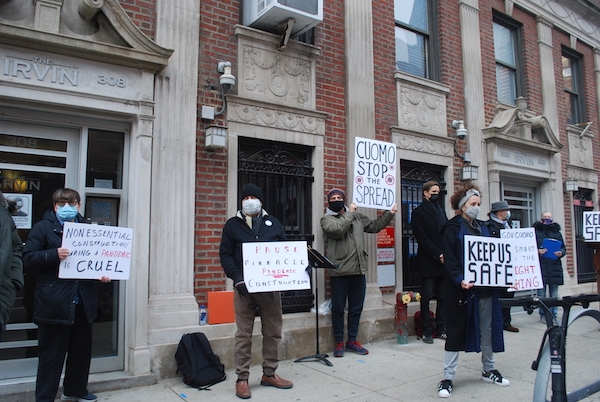
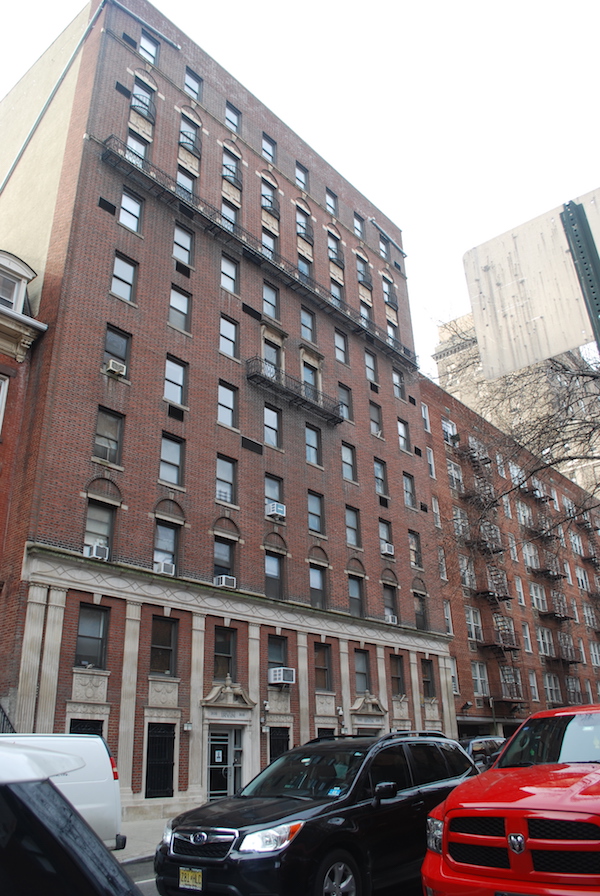
BY WINNIE McCROY | On the morning of Thursday, January 14, a beleaguered group of about 25 tenants and their supporters came together for a press conference in front of 308 W. 30th St. to plead for intervention in what they say are dangerous renovations occurring in their building.
Attempting to shelter in place per Governor Andrew Cuomo’s mandate, tenants say the risks are nevertheless coming to them via workers and contractors without proper personal protective equipment (PPE), inadequate dust and noise mitigation, and a lack of transparency as evidenced by no posted COVID-19 Safety Plan.
Pinnacle Management Group argues they are within their legal rights to do the work, and that tenants’ complaints may be exaggerated. So, tenants now plead with Gov. Cuomo to change the New York State Interim Guidance for Construction Activities During the COVID-19-19 Health Emergency (NYS Interim Guidance), to prevent construction in occupied residential buildings until the pandemic is over.
“With the COVID-19 uptick and the discovery of the more communicable variant, this is not the time for construction renovations in an occupied residential building,” said Denise Yaney, a resident in the building since 1977. “We want to get the governor to put a pause on construction in occupied residential buildings.”
Yaney noted the building’s residents included young children and the elderly, one with a chronic lung condition, one with cancer, and another who is immunosuppressed. Yet she said no COVID-19 Safety Plan had been conspicuously posted, per mandate. Yaney said tenants did not know who the site safety monitor was, what type of COVID-19 screenings workers were receiving, the schedule of cleaning and disinfecting, or even if the cleaning products used were effective against the virus.
Even pre-COVID-19, tenants say they often butted heads with management over harmful materials, gas leaks and noise. With COVID-19 infections and deaths now five times higher than when the construction ban was lifted on June 8, these untimely renovations put them at further risk.
“I think it’s unconscionable that they are allowed to do this, that city and regulatory agencies haven’t taken stronger action,” said Tenant Organizer Natalie Naculich of Housing Conservation Coordinators (HCC). “That said, I do think this organizing work is helpful in building their case. The tenants have been activated, [the landlord is] facing scrutiny from the Attorney General and banks, and I think we can use that base to continue to put pressure on Pinnacle. I agree with the tenants that it’s an oversight in the law not thinking about the differences between occupied and unoccupied buildings. We will bring more tenants on board and continue to pressure the governor’s office, because Pinnacle is bad, but other landlords are also doing this.”
This pre-war building also known as Irvin Condominiums has 61 apartments, which Pinnacle has been converting to condos when rent-stabilized tenants move out. The day after Christmas, residents awoke to an elevator notice announcing renovation plans on six of these empty units—with, as Yaney noted, “not even a note slipped under our doors.” By Dec. 28, 2020, the gut renovations were underway.
“Now contractors and workers are in and out of common hallways and using a common elevator, all which increase our exposure to the coronavirus,” said Yaney at Thursday’s press conference. “Just last Friday the governor said the infection rate is frightening. This is not the time for such intrusive work.”
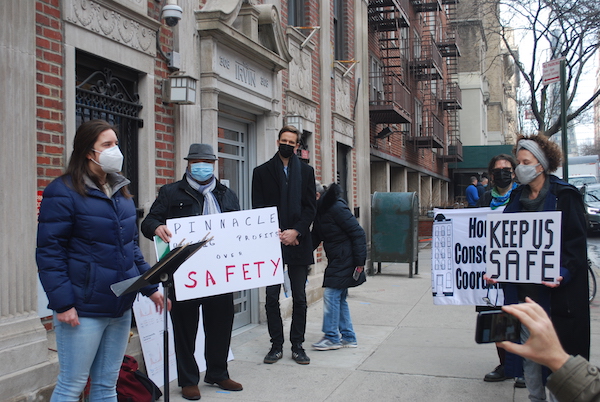
Tenants say they voiced concern to Pinnacle that workers and contractors were not always wearing PPE, had not initially engaged in dust mitigation, were not appropriately cleaning the shared elevator, and were creating excessive noise that prevented them from earning a livelihood. Frustrated that their well-being was viewed an afterthought by landlord Joel Weiner, tenants approached city agencies and elected officials in their plan to halt construction if possible, or at least to force Pinnacle toward more transparency.
“This is a demolition; all the walls and the floors coming down, right to the roughing, which creates an incredible amount of dust and noise,” said Michael Castaldo, who has lived in the building since 1992. “The safety and health of the residents and children are in peril.”
Castaldo said that since Dec. 28, he has seen contractors on multiple occasions not wearing a mask, toxic dust in the hallways, and heard deafening noise created by a sledgehammer or jackhammer. The entire building a worksite, he said, and residents have nowhere to turn for relief.
“This is our home, where we live and work while many of our workplaces are closed,” said Castaldo. “One tenant asked them, ‘Why are you doing this work during a pandemic.’ Their response? ‘Because we can.’ ”
Castaldo then led the crowd as they chanted, “Just because you could, doesn’t mean you should.”
Resident Marcella Warren, who lives beneath and next door to two of the apartments being renovated, said “I have been in both and they are total gut jobs, which means my life will become a living nightmare as well as the impact it will have on my mental health, wellbeing, and the ability to recover from any and all health issues I am facing at this time.”
Also facing health issues is tenant Ron Chin, who is on chemo battling the bone cancer multiple myeloma. Ron is attempting to heal at home, with regular visits to Weill Cornell Medical Center. He and his wife, Heather Chin, are night owls, but the 7am construction start has put an end to that. His wife doesn’t love the banging, and absolutely hates the debris that flies onto their AC unit outside, and the fine dust that floats down through the heat pipe risers. These tenants understand that work needs to happen, but want some transparency in the process.
“It’s for all of our benefit that they at least follow the guidelines that make sense for an occupied building, and that our residents are not left in the dark,” said Ron Chin. “As far as we’re concerned, if the whole building is a construction site, we need to be informed. And all workers need to be trained in the construction COVID-19 guidelines. We have asked for documentation of who the safety monitor is, and they said that contractors, supers and engineers were in the building. But that’s not the same as a safety monitor enacting a site safety plan.”
Echoed tenant Meg Dellenbaugh, “Nobody is here monitoring people’s temperatures, their COVID-19 symptoms, where they have traveled. When we don’t have a safe place to be anywhere in the world, what do we do?”
At Thursday’s press conference, New York State Senator and Manhattan Borough President candidate Brad Hoylman echoed this sentiment, saying he found it “appalling that there are six demolitions occurring as we speak during this intense second wave. It’s just not right.”
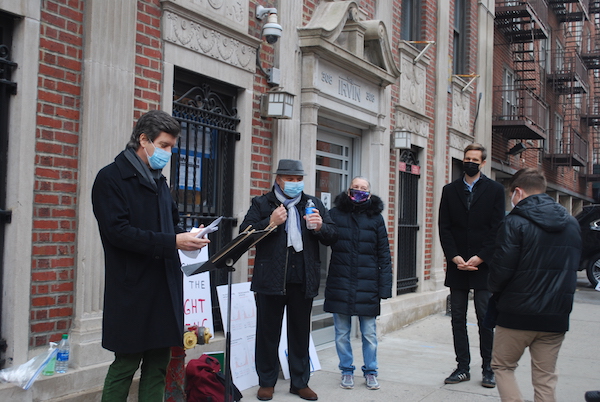
Echoing reports by residents, Hoylman noted his concern about “workers walking around without masks, endangering themselves and residents,” saying,“We need to pause if only for that reason, to ensure infection rates are subdued, as they were when it was lifted on June 8. Now they are almost seven times as high. Based on the numbers alone, we need to make certain constituents are safe by reinstituting a pause on non-essential residential construction. Everyone is working from home, trying to home-school their kids, and get their lives in order in their apartments. How are you going to do that with six apartments being demolished? It’s impossible. I urge the state of New York to reissue the pause on non-essential construction.”
Also in attendance was representative Carl Wilson from New York City Council Speaker Corey Johnson’s office, who read a statement saying that they “stood in solidarity with tenants subject to non-essential work taking place in their buildings and sharing elevators, hallways and common spaces, which poses a very deadly threat to their lives, given that we’re seeing COVID-19 numbers that mirror what they were last spring.”
Wilson then read a letter drafted on Jan. 13 to Gov. Cuomo imploring him to “suspend construction that does not meet an immediate safety need in occupied buildings where workers come into regular contact with residents,” at least until the number of cases decrease to the level they were on June 8. Johnson’s colleagues Sen. Hoylman and New York State Assemblymember Richard Gottfried also signed onto this letter.
Said Wilson in his comments to the crowd, “It’s outrageous to allow non-essential work to continue while people are forced to stay home to work and teach their children! Not to mention sharing common spaces with workers coming and going–and sometimes not wearing masks–so landlords can make an extra buck!”
Also present were Brian Lewis from Manhattan Borough President (BP) Gale Brewer’s office; representatives from both Assemblymember Gottfried’s office and HCC; plus Speaker Johnson’s former Chief of Staff and current City Council candidate Erik Bottcher; and Diana Florence, who is running for Manhattan District Attorney.
These elected officials also signed on to BP Brewer’s Jan. 14 letter to New York City Department of Buildings (DOB) Commissioner Melanie La Rocca, urging her to look into allegations of multiple violations of the NYS Interim Guidance, including that workers were not wearing proper personal protect equipment (PPE), and that appropriate signage was not present.
Noting that many tenants were immunocompromised or elderly and had requested that all non-essential work be halted for the time being, BP Brewer requested that the DOB, “issue an immediate Emergency Stop Work Order on all non-essential work at this building until vaccination of the population has achieved the ratio necessary to ensure herd immunity.”
“People’s lives and health must come before business decisions,” added Leslie Thrope, Executive Director of HCC. “When management companies make decisions that adversely affect the health and safety of the tenants, the government must intervene and ensure that owners do the right thing for the tenants. Governor Cuomo, it is not business as usual! Act now to stop unnecessary construction in buildings.”
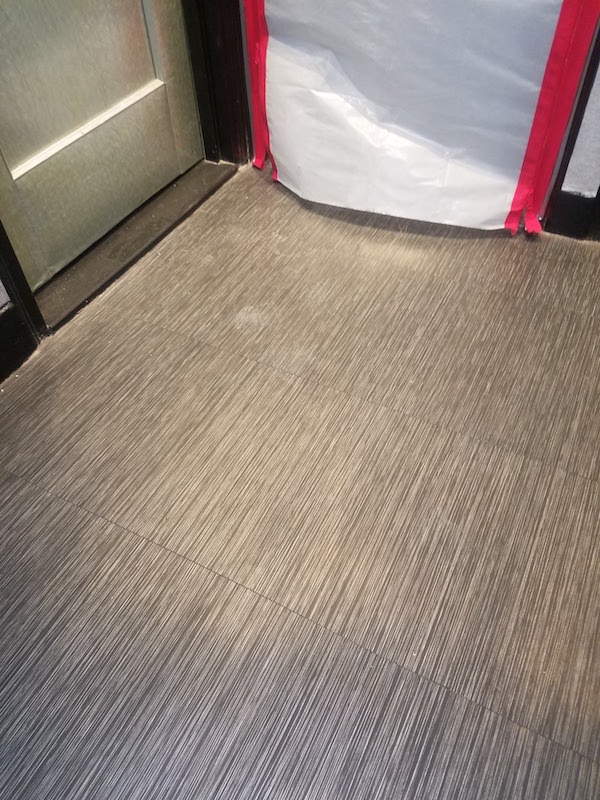
He Said, She Said
As tenants continue to complain about noise, safety issues and a lack of transparency, Pinnacle’s attorney, Ken Fisher, argued that this just wasn’t the case.
“The Department of Buildings have been in the building and they did not issue any violations for work being performed,” Fisher told Chelsea Community News.
But Castaldo said on Jan. 7, the Marshal’s Office—an enforcement division within the New York City Department of Buildings (DOB)—did indeed issue a violation and summons for a “failure to post and distribute a Tenant Protection Plan.” According to the DOB website, the address actually has 125 complaints, and two active violations.
Castaldo said that the “construction was halted by the DOB, with a summons over their failure to post and distribute a Tenant Protection Plan, which they eventually did.”
Fisher copped to this, saying, “The violations were issued with respect to a Tenant Protection Plan being widely distributed, and we have worked it down in a responsible fashion, with no other violations.”
But Castaldo countered that these changes “happened only because multiple tenants called and filed complaints with 311. As you well know, when complaints are made and a DOB agent comes to inspect it, they must see and hear a violation take place at that moment, otherwise they don’t write it up.”
Yaney said that tenants also sent DOB complaints over the lack of posting of a COVID-19 Safety Plan, but that when officials came by, they said they didn’t see any problems. The complaint resolution said COVID-19 Safety Plan had been posted—but inside the apartments under construction, rather than being ‘conspicuously posted’ for all to view, per the law. But she didn’t let it deter her, saying, “That’s our only recourse, to call 311, to file a complaint with a state agency.”
Fisher said the Jan. 7 visit by the DOB only proves how responsive the city agency was being by investigating reported unsafe practices during the COVID-19 lockdown, further evidenced by how many sites had been shut down. But he suggested that tenants at 308 W. 30th St. had it out for them from the get-go.
“The notion that tenants expressed concern about this work before it even started is troubling,” said Fisher. “We too have spoken with elected officials about the safety protocols. Management had someone over there on regular basis and the Buildings Department did not find any unsafe practices, except with regard to our distribution of the Tenant Protection Plan. In terms of other things, I’m not aware of any problems or complaints from people who were not complaining before the work started.”
Pinnacle’s attorney Fisher said that the fact that the DOB hadn’t issued additional summons for violations suggests that tenant’s complaints may be “somewhat exaggerated.” When Chelsea Community News asked if Pinnacle would consider postponing construction work until the spring out of courtesy for the tenant’s concerns, Fisher said, “I don’t know that spring’s going to be any better. [People like me] have been told they won’t be vaccinated until April. And there’s not a lot of work left. The demolition was done quickly, and we have no interest in dragging it out. We want to get this work done.”
HCC’s Naculich said while the landlord had distributed the Tenant Protection Plan, tenants were still waiting to see the COVID-19 Safety Plan, adding, “I think we are going to continue putting pressure on them in as many ways as possible. Tenants don’t trust the contractors and management to do the right thing, but I think between this scrutiny on them by city agencies and the press, they are going to feel more pressure.”
In the meantime, HCC is examining whether these state guidelines for COVID-19 Safety Plans for construction in residential buildings is sufficient to keep tenants safe. Naculich said they are reaching out to DOB to see copy of Pinnacle’s plan, and asking whether workers are being tracked, whether they attest that they aren’t sick, and other questions. Tenants continue to be troubled that there is no on-site safety monitor.
“It’s unclear whether Pinnacle was following guidelines that were insufficient, or whether they were just not following the guidelines,” said Naculich. “That’s potentially another route to advocacy, if the guidelines are not sufficient.”
In the meantime, tenants continue to complain over the constant noise, which they describe as sounding “like jackhammers and sledgehammers,” which some tenants complain is discharging dust and particles of rubble through their heating pipes.
Fisher countered that there were “no jackhammers being used in the building, that the staff was constantly sweeping up, in addition to other dust containment measures and that somebody from management was in the building almost every day,” adding that there were no violations for work from DOB and no complaints from anyone who hasn’t complained before.
“We know one particular tenant was concerned with dust in a stairway from work done a couple years ago, but I don’t believe it’s a current issue,” said Fisher.
Countered Ron and Heather Chin, “We know how they operate. They’re using the same contractors they used when they were doing things improperly before, and they didn’t even have plastic over the doors at the beginning of this. We have to stay on top of every little thing, or they will do anything they want. It’s not until we complain that they’ll do it properly.”
Tenants say workers and contractors are not wearing appropriate PPE and are not cleaning up in common areas. Said Dellenbaugh, a tenant there since 1980, “There are a lot of elderly folks in our building—half the rent-regulated tenants are over 60—who should not be exposed to workers coming here from all over the city with no masks on. It’s treacherous, and actually life-threatening.”
Fisher was very responsive to this allegation, saying that the management had given the contractor very strict instructions to follow appropriate COVID-19 protocols.
“If anyone sees a worker not wearing PPE, they should contact the management office immediately,” said Fisher. “We can’t do something about what we don’t know about.”
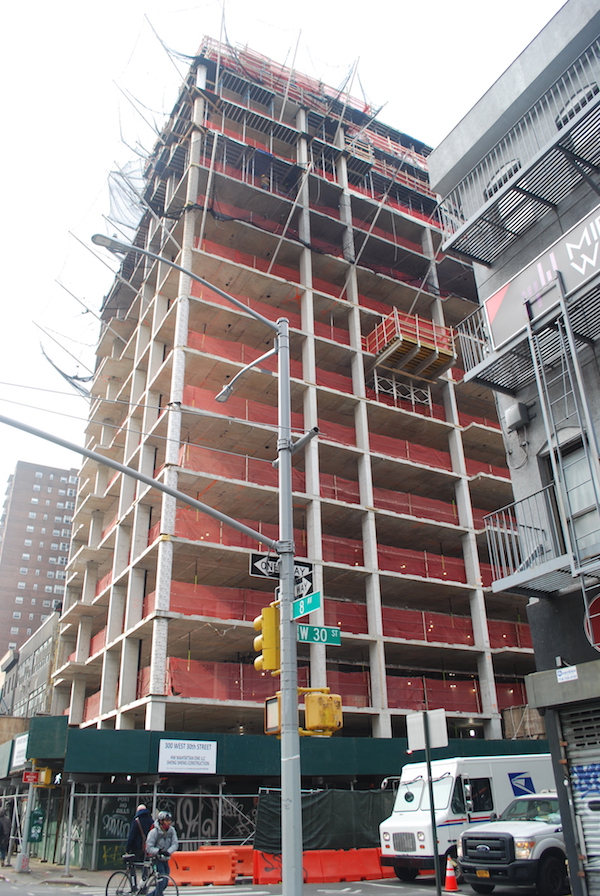
Yaney admits that since they complained she had seen masked workers wiping and disinfecting stair railings and doorjambs and mopping up on floors where construction is taking place. But a tenant witnessed team of workers exiting the elevator without masks, as well as a contractor without a mask. When spoken to about it, he said he was “only going a short distance.’ And he’s a contractor who has worked in this building since 2006.”
Tenants are tired of the lack of transparency, with Castaldo saying, “In my humble opinion, their code of conduct is purposely not transparent. It’s on the sly, with extremely poor communication. This is the way they operate.”
Fisher said this was untrue; that Pinnacle was “always willing to work with tenants who want to work with them, but when tenants run to politicians and the papers instead of calling management, it indicates they are not sincere about us working with them.”
Yaney said this was untrue, pointing to a Dec. 29, 2020 call she made to Senior Property Manager Elinor Arzt, saying, “This is not the time to do this. It’s a big mistake and it’s putting us at risk.” Yaney said Arzt replied that they could, “because they ‘got the permits.’ They are doing it because they can, not because they should. But they have got to put a pause on this for now. We’re not looking to stop it forever.”
Tenants say the noise is also a big factor in their request to temporarily halt the construction. But Pinnacle’s lawyer points out that noise is part of city life, saying, “unfortunately construction work causes noise, and it’s being done as quickly as we can. It’s not being done for any reason other than to renovate, but noise is what happens when you live in a dense urban environment like New York City.”
Yaney noted that although there was also a great deal of construction noise from 300 W. 30th St.—a new building being erected on their corner—the work there was not impacting people’s health and well-being in the same way. But without any distinctions in the state construction guidelines regarding occupied verses non-occupied buildings, “the landlord took advantage of this freedom to do work in buildings where people actually live, and are now stuck at home working, or with compromised health.”
“Maybe [the governor] didn’t think this would happen in residential buildings, because the guidelines are for general construction, with nothing specific to office spaces or residential buildings,” she added.
Said Dellenbaugh, “I understand landlords need to make money, but I don’t have sympathy for our landlord because they have already made millions on our building alone. This big company doesn’t need this money, and these apartments were habitable the way they were. They could have rented them as is and put off construction until the pandemic was over, or even waited until the spring when we could go outside.”
Working From Home
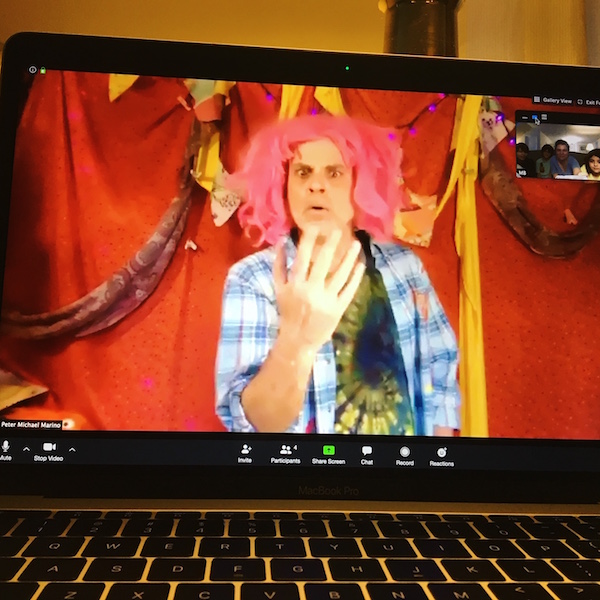
Many tenants say the construction noise has made working at home nigh on impossible. Performer Peter Michael Marino finds himself scrambling to get his voice-over work done while the construction workers are on their lunch break. And forget about massage therapist Dellenbaugh.
“There is just no way I could work from home,” she said. “I have just had to cancel clients or rent an office space when they are working above me. It’s incredibly noisy, deafening, migraine-creating noise. I went up to see why it was so noisy and they literally had hammers pounding on the concrete floor.”
Marino said even with professional equipment and soundproofing, you need absolute silence when recording. But with workers banging away, the reverberations make it impossible. When Chelsea Community News last spoke with Marino, he was preparing to perform at an online birthday party for a family in Australia. All he could do was hope the noise didn’t interfere.
“Due to the global pandemic, I am forced to work from home…where I have lived since 1987,” said Marino. “The pandemic has forced me to teach, perform a children’s entertainment show for schools and parties, and do voice-overs all from [my apartment]. The noise from the construction will greatly affect my business and I will be forced to stop all of my jobs. This is not the time to be doing this kind of work.”
Marino said he could barely concentrate enough to write his next show. Pre-COVID-19, Marino would just “go to the library or Starbucks to work,” but now, there is no place to go.
“I live in New York and understand construction, but it’s an unprecedented time,” said Marino. “I feel like they have no consideration for people’s jobs.”
“The main problem now is that with the pandemic, we have no other place to go,” echoed Dellenbaugh. “There is no other safe office space for me to rent, I can’t sit in a coffee shop to get away from the noise, and it’s too cold to sit outside. The timing of this to me is the perfect storm, in terms of that it leaves us with absolutely no safe place to be.”
“We have no place to go,” echoed Yaney.
A History of Bad Behavior
Tenants may have reacted to the current construction differently, said Castaldo, if there were not such a long history of problems with Pinnacle Management and landlord Joel Weiner. Castaldo has the dubious honor of being one of the only tenants to have ever successfully sued Weiner in Housing Court, with Judge Jack Stoller adjudicating in his favor on Jan. 23, 2020.
“Years and years of mistrust and abuse of our rights and warranty of habitability per our rental leases has been going on in this building for the past 20 years,” Castaldo told Chelsea Community News. “But that was the first time Pinnacle lost in a case, and it’s now on record and anyone can use it as a precedent.”
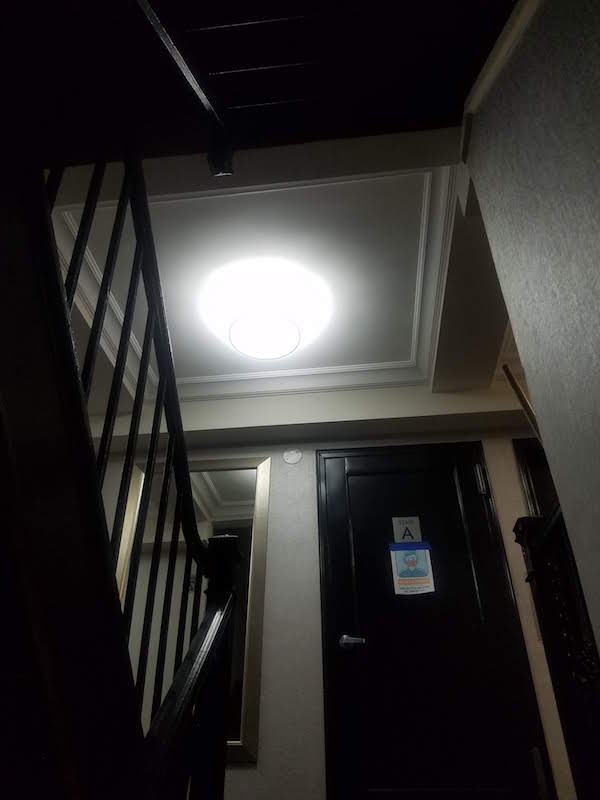
Weiner and his partners at Pinnacle Management Group purchased the building in 2006. But Castaldo and his cohorts say they did not approach their new owners with animus. At that time, Castaldo was the president of the now-defunct Tenant’s Association and was leading half of the tenants on a rent strike after former owner Sheldon Harnick allowed a middle-of-the-night asbestos rip-out by an “undocumented, unbonded, unlicensed asbestos company” that drew the attention of the Department of Environmental Protection and Federal Bureau of Investigation, reportedly resulting in jail time and a $130,000 fine.
Tenants say they picketed lyricist-cum-landlord Harnick at his Upper West Side luxury building The Beresford, and with neighbor Jerry Seinfeld watching, forced Harnick to attest in writing on his own letterhead that he would fire the management company and settle, to avoid subjecting tenants to possible asbestos poisoning.
So, when Weiner took over the building in 2006, they welcomed the change in management. But Castaldo soon discovered that “he was worse than the previous one.” Castaldo said the multi-billionaire had been sued at least 100 times, but had settled the cases, pointing as evidence to a lawsuit by a tenant advocacy group that attempted to use the RICO Act, but which was ultimately settled.
Said Castaldo, “People are fearful and intimidated, and don’t want to go up against these deep-pocketed landlords.” Still, after an initial skirmish with Weiner over control of the building bulletin board, Castaldo said that tenants enjoyed three years without any issues. Then, the company began doing brick repointing in a manner that Castaldo said did not take into account the lead paint and asbestos present in their pre-war building.
“Then they began their conversion of our building from rent-stabilized to condo,” said Castaldo. “It was a non-eviction plan but they were still harassing us, and we were living in a dust bowl. They converted about 20 apartments, redid the roof, basement, sidewalk, brick pointing, hallways, and lobby. There was construction in nearly 50 percent of the building—how were we supposed to escape all of this? So, my wife and I contacted an attorney and started withholding a portion of our rent.” (William Gribben of Himmelstein, McConnell, Gribben, Donoghue & Joseph, LLC.)
Between 2014–2020, Castaldo and Weiner sued and countersued. He said they slogged through sixty different court dates, with Pinnacle’s lawyers constantly asking for extension and “dragging it out to make us spend money on legal fees.”
“I knew we’d have to go all the way, to let a judge hear the case and make a final decision,” said Castaldo. “And on January 23, 2020—after six years—the judge gave me and my wife one of the largest rent abatements in New York City history,” reportedly an initial 25 percent abatement, with an additional 15 percent added later.
Castaldo said he lost time, money and his health, but was glad to know that “at least our efforts will serve tenants in our building and all the tenants in New York City, now that they have our case as a precedent.” Castaldo is still attempting to get a percentage of their legal fees back, per the law.
Pleading with Cuomo for Help
With the threat of COVID-19 casting pallor on everyday life, tenants said they did not have years and years to battle this current round of renovations in court. Instead, they are pleading with Gov. Cuomo to take another look at the NYS Interim Guidance with regards to construction in occupied residential buildings.
“We’re at a loss as to why this renovation needs to happen now and agree with what [Gov. Cuomo] wrote on Nov. 9, ‘The accelerating rate of new cases is especially worrying, I know we are all tired, but once again, we must treat this crisis with the seriousness it calls for,’ ” said the Chins. “Please put safety and sanity over money and consider a fresh examination of construction and infrastructure repair regulations during these precarious times. New Yorkers need peace.”
Speaker Johnson, Sen. Hoylman, and Assemblymember Gottfried took up their cause via that Jan. 13 letter, noting that the pandemic had significantly worsened since the pause was lifted in June, and imploring Gov. Cuomo to suspend non-essential construction until case numbers decreased to the level they were back in June. They also asked for stronger enforcement of safety protocols, like intensified inspections and increased fines.
“As our City faces a frightening spike in COVID-19 cases, safety precautions must once again take top priority,” said Sen. Hoylman. adding, “I am urging the governor to place a temporary pause on nonessential internal renovation work in occupied residential buildings. New Yorkers deserve to feel safe in their own homes. While the tenants of 308 West 30th Street are sounding the alarm, many in our district and around the City are facing a similar problem. We need to take proactive steps to prevent further spread, especially now as we ramp up vaccine distribution.”
“The spike in COVID-19 cases has been frightening, especially for residents of buildings that are undergoing construction,” echoed Assemblymember Gottfried. “I implore the governor and mayor to restrict unnecessary construction that increases the chances of spread inside residential buildings and to step up enforcement of existing orders to keep my constituents safe in their homes. The harassing, lawless landlord of 308 West 30th Street shouldn’t be allowed to do anything in this building at all.”
For their part, tenants do understand that Pinnacle Management Group will eventually need to do gut renovations on the formerly rent-stabilized units they want to transform into million-dollar condos. They are just hoping against hope that what they see as dangerous, unsafe, and noisy renovations could wait until tenants aren’t also battling a deadly worldwide pandemic.
Barring that, they would like to know that the management company cares about their health, has a COVID-19 Safety Plan in place to mitigate any potential damage, and that there is an on-site safety monitor ensuring compliance with all aspects of this safety plan. Having exhausted all avenues of redress, they are throwing themselves on the mercy of the governor of New York State.
“As much as we all appreciate Gov. Cuomo’s guidance in the midst of this COVID-19 pandemic, there’s a disconnect,” said Yaney. “He says be smart and safe, stay at home if possible, and we at 308 West 30th Street have been doing so. But now we’re being put at risk, right here in our own home.”
Chelsea Community News is made possible with the help of our awesome advertisers, and the support of our readers. If you like what you see, please consider taking part in our GoFundMe campaign (click here). To make a direct donation, give feedback, or send a Letter to the Editor, email scott@chelseacommunitynews.com.

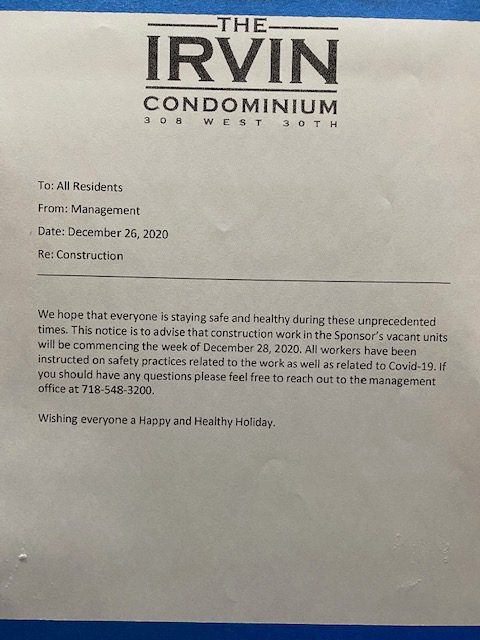
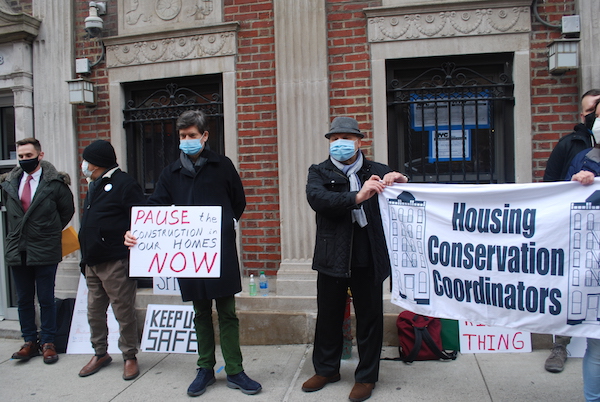

2 Responses to "Chelsea Tenants to Cuomo: Nix Toxic Mix of COVID, Profit Motive Construction"
You must be logged in to post a comment Login